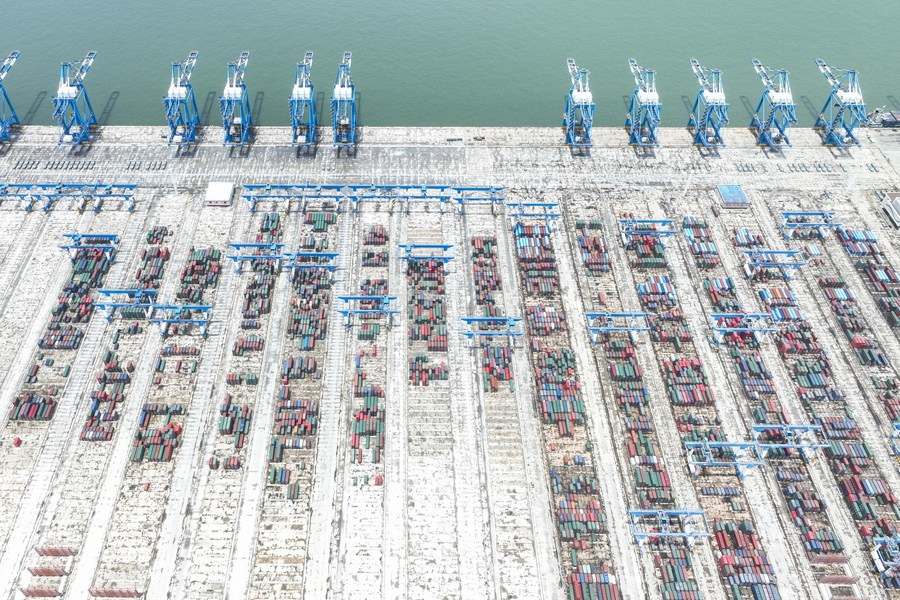China's foreign trade to sustain growth with resilience, potential

This aerial photo taken on July 22, 2023 shows an automated container wharf of the Beibu Gulf Port in Qinzhou, south China's Guangxi Zhuang Autonomous Region. [Xinhua/Cao Yiming]
BEIJING -- China's foreign trade is expected to maintain steady growth despite a challenging external environment, as the country continues to strengthen endogenous impetus and expand multilateral economic and trade relations, experts have said.
China's imports and exports expanded 0.4 percent year on year to total 23.55 trillion yuan (about 3.29 trillion U.S. dollars) in the first seven months of 2023, according to the General Administration of Customs (GAC).
Since the second quarter, the country's monthly trade scale has remained above 3.4 trillion yuan.
In July alone, China's foreign trade totaled 3.46 trillion yuan, up 25.7 percent from July 2019 and 4.5 percent above the 2020-2022 July average.
The latest data was in line with expectations, and China's foreign trade maintained stable operations, GAC spokesperson Lyu Daliang said.
The fundamentals for long-term growth have not changed, Lyu added.
Analysts have said that the fundamentals for long-term foreign trade growth also remain unchanged, citing the country's growing export competitiveness and more diversified market and product structures as its development advantages.
Zhang Jun, chief economist at China Galaxy Securities Co., Ltd., said Chinese export products have climbed up the global value chain after continuous industrial upgrading.
China's general trade, which involves long industrial chains and high added values, rose 2.1 percent to 15.41 trillion yuan in the first seven months of the year. It accounted for 65.4 percent of the country's total foreign trade value, up 1.1 percentage points from a year earlier.
The total export value of China's three major tech-intensive green products -- solar batteries, lithium-ion batteries and electric vehicles -- soared 61.6 percent year on year in the first half of 2023. Together, the three products contributed 1.8 percentage points to the country's overall export growth during the period, customs data shows.
China has been cultivating its economic and trade relations with Regional Comprehensive Economic Partnership member countries, the Association of Southeast Asian Nations (ASEAN) and countries along the Belt and Road, providing Chinese companies with more opportunities to explore foreign markets, said Xu Yingming, an analyst at the Chinese Academy of International Trade and Economic Cooperation.
In the January-July period, ASEAN remained China's largest trading partner. China's trade with ASEAN members rose 2.8 percent year on year.
In the first seven months, China's trade with countries along the Belt and Road amounted to 8.06 trillion yuan, jumping 7.4 percent year on year and accounting for 34.2 percent of the country's total trade value.
Looking at the second half of the year, Ministry of Commerce official Li Xingqian said the situation is extremely grim, citing weak global demand for production, consumption and investment, and "decoupling" or "de-risking" moves from some countries.
However, China will take further steps to help companies secure orders and expand their markets, including hosting trade expos, increasing numbers of international flights and facilitating visas for foreign businesspeople, Li said.
The country has already seen increasing confidence in foreign trade companies. Some 75 percent of the over 3,100 foreign trade companies surveyed by the China Council for the Promotion of International Trade said they were confident about their third-quarter development.
Peng Yi'an contributed to the story.
























